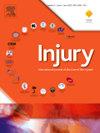A finite element analysis of the trapezoidal plate. How to get a stable fixation at different fracture lines?
IF 2.2
3区 医学
Q3 CRITICAL CARE MEDICINE
Injury-International Journal of the Care of the Injured
Pub Date : 2024-11-09
DOI:10.1016/j.injury.2024.112020
引用次数: 0
Abstract
The fractures in the condylar area are a challenge for every surgeon, for the treatment of which trapezoidal condylar plate is used in most cases. However, it is not possible to position the plate in the ideal osteosynthesis lines according to Meyer et al. in every clinical situation. In many cases, the fracture line is also not in the centre of the trapezoidal plate. The aim of this study is to investigate the osteosynthesis rigidity and the effect of plate localisation relative to the fracture line.
In a simulation model in the first group the plate was positioned in the ideal position in the middle of the condylar base, in the second group the plate position was changed - the plate was shifted upwards until the fracture passed underneath the centre of the plate again and in the last group the plate was moved further down so that the fracture passes underneath the middle of the plate. Heterogeneity of the bone was simulated using different sets of biomechanical properties.
In the experiment, the joints were fully constrained and a force of 500 N was applied to the opposite side. An interaction between bone and plate was completely excluded and the stability of the plates as well as the mobility of the bone fragments was analysed.
The results have shown that an inferior position of the fracture line leads to greater mobility of the fragments if the position of the osteosynthesis material is the same. With a deep fracture line, a more cranial positioning of the plate leads to better stabilisation. This study needs to be experimentally validated.
梯形钢板的有限元分析。如何在不同骨折线处获得稳定的固定?
髁状突部位的骨折对每一位外科医生来说都是一项挑战,在大多数情况下,髁状突梯形骨折钢板都是用于治疗髁状突骨折。然而,并不是每种临床情况都能按照 Meyer 等人的理想骨合成线定位钢板。在很多情况下,骨折线也不在梯形钢板的中心。本研究的目的是探讨骨合成刚度以及相对于骨折线的钢板定位的影响。在模拟模型中,第一组的钢板定位在髁突基底中部的理想位置,第二组的钢板位置发生了变化--钢板向上移动,直到骨折再次通过钢板中心下方,最后一组的钢板进一步向下移动,使骨折通过钢板中部下方。使用不同的生物力学特性模拟骨的异质性。在实验中,关节受到完全约束,对侧施加 500 牛的力。完全排除了骨与钢板之间的相互作用,分析了钢板的稳定性和骨碎片的流动性。结果表明,如果骨合成材料的位置相同,骨折线位置越低,骨片的活动度越大。在骨折线较深的情况下,钢板的位置越靠前,稳定效果越好。这项研究还需要实验验证。
本文章由计算机程序翻译,如有差异,请以英文原文为准。
求助全文
约1分钟内获得全文
求助全文
来源期刊
CiteScore
4.00
自引率
8.00%
发文量
699
审稿时长
96 days
期刊介绍:
Injury was founded in 1969 and is an international journal dealing with all aspects of trauma care and accident surgery. Our primary aim is to facilitate the exchange of ideas, techniques and information among all members of the trauma team.

 求助内容:
求助内容: 应助结果提醒方式:
应助结果提醒方式:


